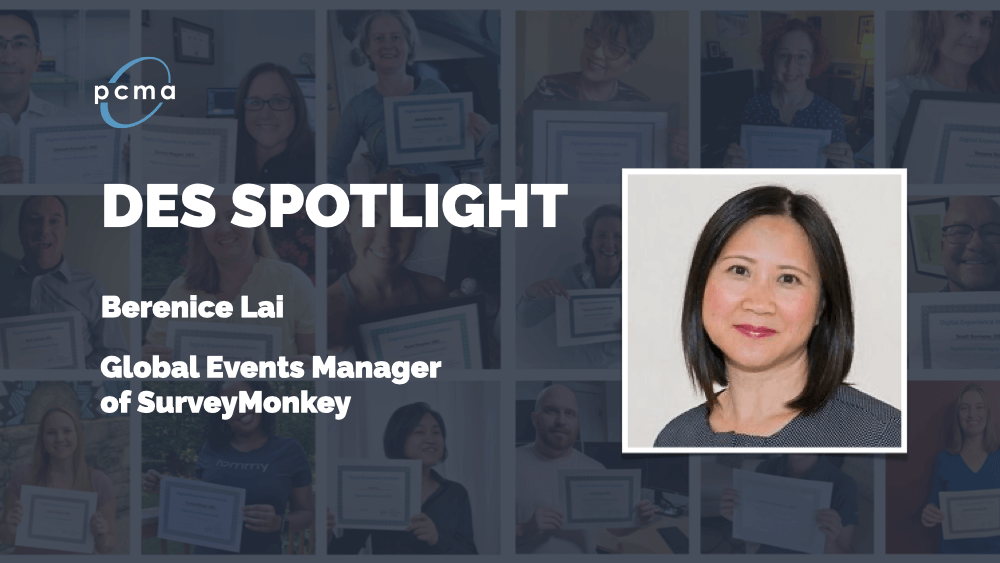A lifelong learner, Berenice Lai decided to pursue Digital Event Strategist (DES) certification since COVID-19 forced her and her organization pivot to virtual in March 2020. We checked in with her to see how she’s applying key learnings from the DES course in producing successful virtual events for her organization.
Tell us a little bit about what you do.
I run global events for SurveyMonkey. My focuses are employee engagement, investor relations and Diversity, Equity and Inclusion (DEI) recruiting events. In times like this, obviously, it would be through a virtual environment.
Your title is Global Events Manager. Does that mean you’re bringing events to SurveyMonkey employees based in different parts of the world?
Yes, we have ten offices worldwide. Right now, we have about 1400 employees in Ottawa, Dublin, and Amsterdam as well as across the U.S.
And I imagine that when you’re running the digital events, you must accommodate the different time zones of your audience?
Correct! Not only do we try to balance time zones, we also make sure the content is relevant to employees across the company. We always ask ourselves, “How can we be inclusive?”. In the Digital Event Strategist course, subject matter expert Sourabh Kothari talks about different personas and how they impact the design of virtual events. We go through the same exercise when we plan ours.
What inspired you to pursue DES in the first place?
I see myself as a lifelong learner. I love learning new things, and I love to dig deep and look at things from different perspectives.
To be frank, by the time I took the DES course, I already had more than 50 virtual events under my belt. That didn’t stop me from signing up because I like learning both ways — I learn by doing and by watching. I just wanted to be in a classroom setting and see different cases presented by subject matter experts.
As a corporate planner, I’m not exposed to a wide variety of events like event professionals who work for agencies or associations. The SMEs who taught the DES course expanded my horizons across event formats, approaches and perspectives. These learning experiences help me approach event management differently. It’s my personal philosophy that when you get exposed to new things, you are better equipped to find new ways to solve problems.
You were producing virtual events even before you took the DES course. Since completing the course, what key learnings from it have you implemented in your digital events?
From March through June, I produced more than 35 large and small virtual events. When the pandemic started to blow up, I had to determine how to manage the in-person events that were imminent and organize virtual alternatives in short order. All 1400 employees became remote in a matter of five business days. We didn’t have the luxury of time, so we relied on our collective 20 years of event experience to kickstart our virtual programs. We built the train tracks as we went, and there was not a systematic way of planning.
Taking the DES course helped me slow down and put some scaffolding in the way I approach virtual events. I feel more confident and comfortable now. If I am planning a larger event like a user conference, I will know the right questions to ask and the overall structure that I need to pull off a successful event.
If a friend or colleague is on the fence about taking DES, what would you say to nudge them?
I really think it’s worth investing the time in oneself. There is always something new to learn, especially in the rapidly changing landscape of virtual events. It’s a good chance to construct the scaffolding I mentioned, go back to the basics, and apply the processes taught in the DES course to your work stream rather than going about it ad hoc or piecemeal.
——
The Digital Event Strategist Spotlight series features Digital Event Strategists and how they are making an impact in their work through digital and hybrid events.
For inquiries about the Digital Event Strategist certification, please complete this form.

